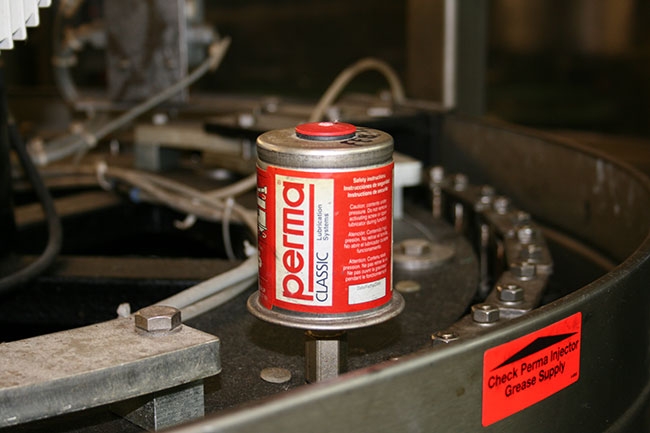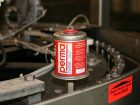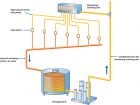
Products & Equipment
Pits & Quarries
Lubricating crushing machines in quarries
Keeping crushing equipment running productively
February 26, 2018 By Mike Deckert and Gabriel Lopez FLO Components

February 26, 2018 – Most quarry or aggregate operations include some type of crushing machine or functions. By definition, crushers are used to reduce large rocks into smaller rocks or rock dust, depending on the requirement of the operation and material being crushed.
The actual crusher can be in the form of a cone, gyratory, impact, jaw, etc. – type machine. Common to all crushers is the requirement for lubrication, be it oil lubrication (e.g. for gear boxes) or grease (e.g. for bearings). The pure nature of crushing rocks produces many possible issues and considerations to tend with on a daily basis.
For crusher systems that use oil lubrication for example, contamination of oil is a common issue and a fact of life. One solution is to use a circulating oil lubrication system (CircOil) to remove contaminants or “condition” the oil, to optimize the lubrication and maintenance of the crusher. In contrast to total loss lubrication systems (where lubricant is not collected after it is applied to the lube point), in a CircOil System, after the oil passes through the lubrication point, it is collected, conditioned and reused. In addition to lubricating and filtering out wear particles from friction points, CircOil systems also help maintain the lubrication points at a proper temperature, prevent corrosion, and remove water condensation.
CircOil systems can include a wide range of tailor-made and turnkey solutions for flow rates from 0.1 to 3,000 l/min. Oil stored in the oil supply unit is continuously pumped out and separated by hydraulic resistors (orifice tubes, adjustable metering valve distributors, throttles, etc.), flow limiters or progressive feeders, or multi-circuit pumps (multi-circuit gear pumps or multi-circuit piston pumps with one pump each per lube point). The right amount of oil is distributed to the lubrication points. The actual feed rates can be controlled visually or electronically. Monitoring systems with individual warning levels are also available for a more predictive maintenance approach. Once it’s passed through the lubrication points, oil containing particles, air and water is fed back through a return line into the oil supply unit where it is reconditioned and reused.
Benefits
- Efficient cooling and lubrication
- Removal of particles
- Removal of air, condensation and process water
- Integrated condition monitoring
- Demand-based distribution of lubricant which can be monitored
In some special oil lubrication cases such as extreme heat applications, additional lubricant filtration or conditioning is required and can be achieved using oil conditioning units. These are low-volume off-loop or kidney loop systems, installed directly onto existing CircOil systems. A unit provides continuous oil filtration to remove contamination and usually includes a cooler to maintain the operating temperature of lubricating oil, protecting the machinery from unexpected failures by protecting the lubricant and extending its useful service life. Oil conditioning units are used effectively in many applications such as large bearing housings, compressors, and gearboxes. They can be retrofitted on machinery where the existing conditioning is not satisfactory or does not exist.
Other lubrication considerations in quarries include crushers with bearings that need to be greased, such as the shaft bearings in jaw-type crushers. The majority of these bearings are manually lubricated. Some have remote grease lines, allowing maintenance personnel to grease safely from a distance. In many cases, an automatic lubrications system (ALS) is a good alternative in this type of application.
ALS was discussed extensively in the July/August 2017 issue of Rock-to-Road, but in general, the biggest benefit of installing a proper ALS is the bearings will be receiving grease while the machine is in operation and will result in more even grease film thickness/coverage; consistent grease wedge developed around the bearing; lower power consumption and smoother machine operation; reduction of high impact due to the operation of the crusher; and safety for maintenance and operating personnel.
Other crushers employ single point automatic lubricators (SPALs) for their bearing lubrication (also referred to as drip feed lubricators or drip greasers). SPALs are typically used for lubrication points that are located in hard-to-get locations. These points could be manually lubricated, but often, due to their location, with limited success. In some cases, there are potential safety issues in getting a technician to the location to lubricate. The end result is a lack of confidence the lubrication schedule is being maintained. Whether or not the right amount of lubricant is consistently being delivered becomes another on-going source of concern.
SPALs are a relatively inexpensive solution to these issues. Simply install the lubricator either directly on the bearing or through a remote line, set the timer as applicable and record the scheduled time for replacement of the unit.
SPALs are available in a wide range of configurations. The correct solution for a specific application will depend upon environmental conditions; location of the single point lubricator in relation to the lubrication point; how long between replenishment; and physical space available at the lube point.
At the end of the day, normal operations within a quarry will have some effect on either the oil or grease lubrication. Maintaining the lubricant through proper conditioning will extend the lubricant life. This, along with implementation of best lubrication practices and systems such as the automatic greasing systems on key bearings or the single point automatic lubricators on difficult to reach bearings will show benefits with increased uptime and longer machine life.
Print this page

